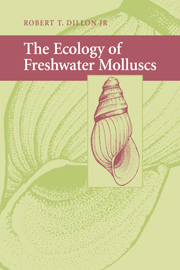2 - Bivalve autecology
Published online by Cambridge University Press: 11 August 2009
Summary
In this chapter we will review a few of the basic attributes of the biology of freshwater bivalves. Although filter feeding might at first seem a relatively simple process, closer examination shows a wide discrepancy between the particles in the medium (often largely inorganic) and the food actually assimilated (diatoms, green and blue-green algal cells, bacteria, and organics both dissolved and suspended). Our discussion of bivalve feeding will be divided into sections on particle retention, ingestion, and assimilation. There is some large-scale diet and habitat specialization in bivalves; Pisidium seems to have become adapted to filter waters from within the sediments, sometimes deep in the profundal zone, and Dreissena has colonized the hard bottoms. But in general, we will see that all bivalve populations seem to live in about the same habitat and eat about the same food at the same time. In light of the evidence that large populations of bivalves may substantially depress the concentration of suspended particles in even the largest lakes and rivers, the potential for food limitation and both intra- and interspecific competition must be acknowledged.
The freshwater bivalves are quite diverse in their modes of reproduction. We will see that unionoids are gonochoristic (although their mechanisms of sex determination are unclear) with widespread hermaphroditism. Their adaptation to hold developing larvae (‘glochidia’) and impose them parasitically upon fish hosts constitutes one of the more interesting natural history sagas of which I am aware.
- Type
- Chapter
- Information
- The Ecology of Freshwater Molluscs , pp. 8 - 56Publisher: Cambridge University PressPrint publication year: 2000



